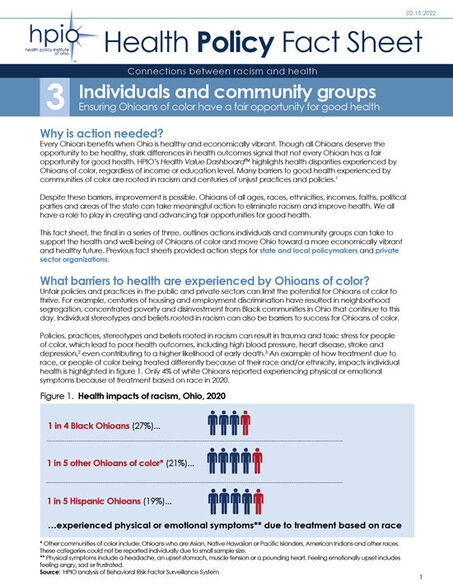Connections between racism and health:
Individuals and community groups
Overview
Every Ohioan benefits when Ohio is healthy and economically vibrant. Though all Ohioans deserve the opportunity to be healthy, stark differences in health outcomes signal that not every Ohioan has a fair opportunity for good health. HPIO’s Health Value Dashboard™ highlights health disparities experienced by Ohioans of color, regardless of income or education level. Many barriers to good health experienced by communities of color are rooted in racism and centuries of unjust practices and policies.
Despite these barriers, improvement is possible. Ohioans of all ages, races, ethnicities, incomes, faiths, political parties and areas of the state can take meaningful action to eliminate racism and improve health. We all have a role to play in creating and advancing fair opportunities for good health.
This fact sheet, the final in a series of three, outlines actions individuals and community groups can take to support the health and well-being of Ohioans of color and move Ohio toward a more economically vibrant and healthy future. Previous fact sheets provided action steps for state and local policymakers and private sector organizations.
More resources
HPIO resources
- Connections between racism and health
- Connections between racism and health: Private sector organizations
- Connections between racism and health: State and local policymakers
- Action Steps to Eliminate Racism resource page
- HPIO health equity work
Additional resources
Individual Ohioans and community groups have made a concerted effort to dismantle racism and other forms of discrimination. Every Ohioan has an active role to play in ensuring that they and their peers have the opportunity to reach their full health potential. The following resources provide guidance, tools and recommendations to support further action:
- Implicit bias module series, Kirwan Institute for the Study of Race and Ethnicity
This series includes four interactive modules that help participants understand the origins of implicit associations, uncover their biases and learn strategies to address them. - Project Implicit, Harvard University
Project Implicit provides Implicit Association Tests to assess unconscious attitudes and beliefs on topics such as race, gender, disability and skin tone. - Addressing racism: Anti-racism resources, University of Minnesota Alumni Association
This page provides books, webinars and tools that explain racial bias and systemic racism. - Healing from the effects of internalized oppression, Community Tool Box
This tool offers information on the impacts of racism and strategies for reducing the impacts of internalized oppression. - Truth, racial healing and transformation implementation guidebook, W.K. Kellogg Foundation
This guidebook is a community-based tool that works to engage individuals and organizations in dismantling systemic racism through active discussion of racial history, community building and organizing spaces for racial healing. - Tools & resources for achieving racial equity in policymaking, Independent Sector
This page provides resources that can help individuals and groups center racial equity into their policy and overall strategic work.
By:
Amy Rohling McGee, MSW
Carrie Almasi, MPA
Reem Aly, JD, MHA
Published On
February 11, 2022
Table of Contents
 Download Publication
Download Publication
